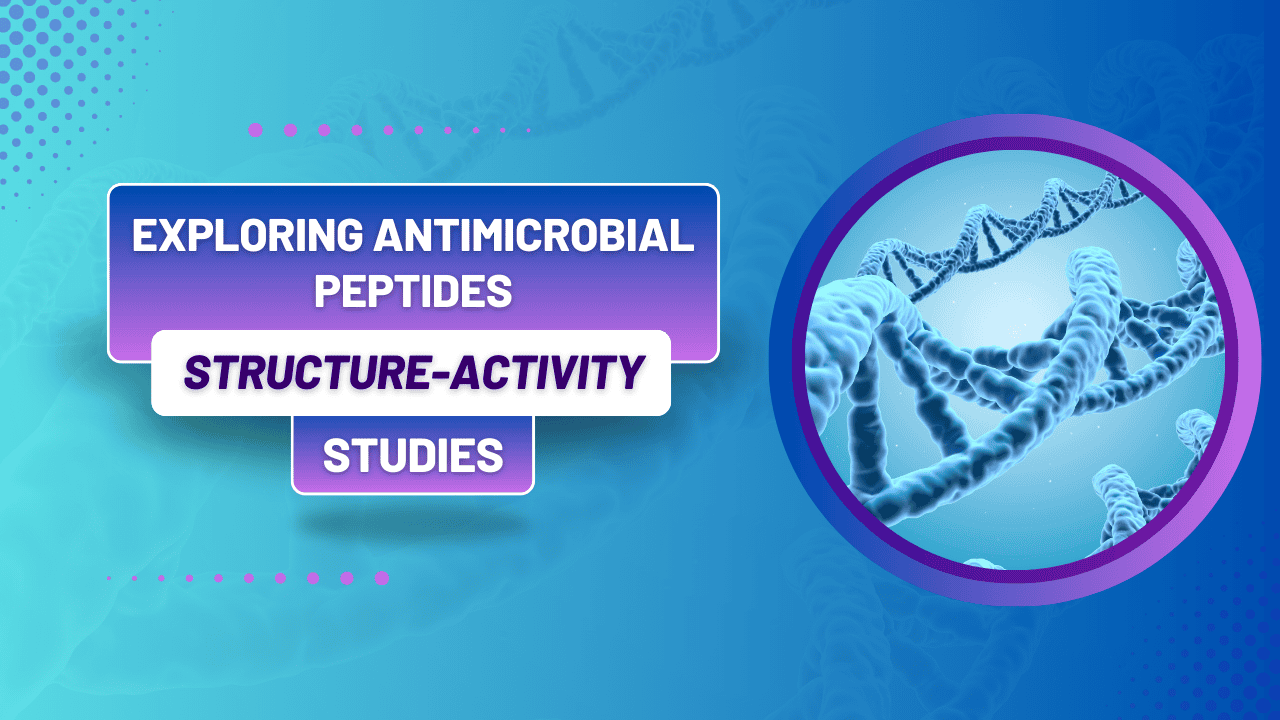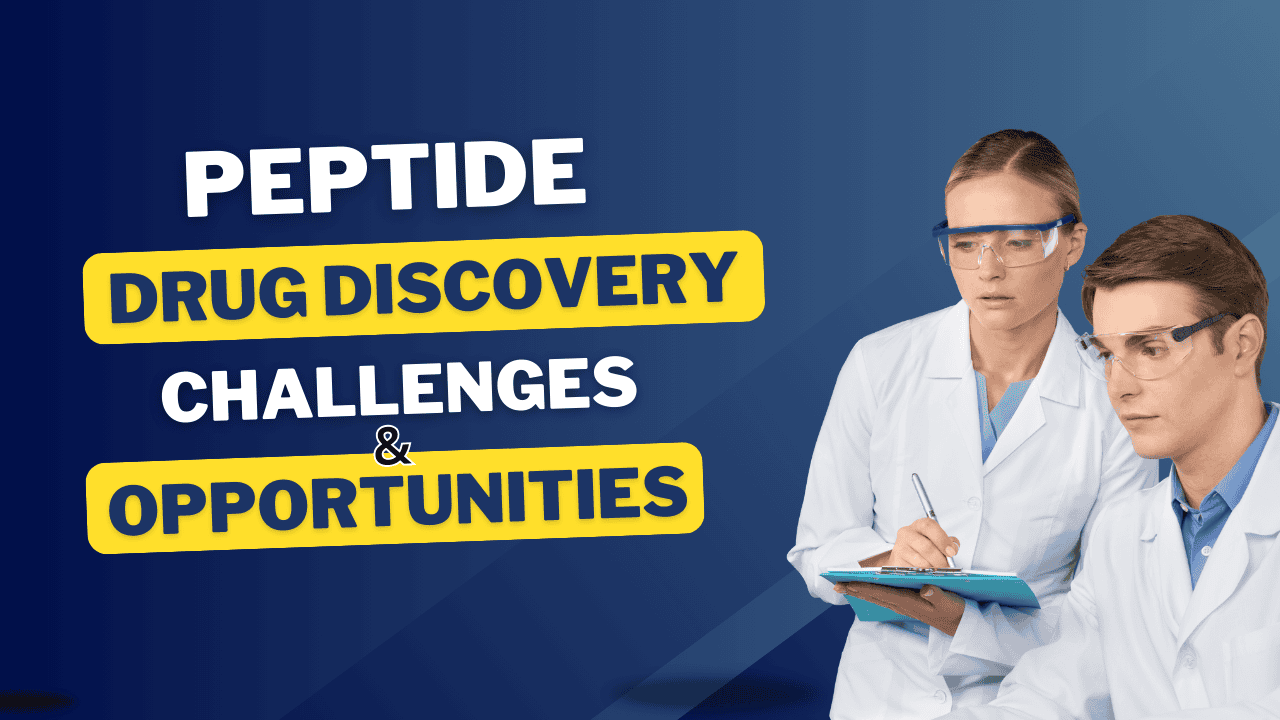

Peptides, with their versatile structures and diverse functions, have emerged as promising therapeutic agents in drug discovery.
This article dives deep into the exciting realm of peptide drug discovery, exploring both the challenges and opportunities this field presents.
From understanding the nuances of peptide therapeutics to navigating the complexities of drug delivery, this comprehensive guide has got you covered.
Peptide drug discovery involves the identification and development of peptides as potential therapeutic agents. These short chains of amino acids can mimic natural proteins in the body, offering unique advantages in targeting specific diseases.
Peptides play a crucial role due to their high specificity and affinity for targets, which makes them ideal candidates for tackling complex diseases. Unlike small molecules, peptides can modulate protein–protein interactions with high precision.
Peptide therapeutics are drugs that use peptides to produce therapeutic effects. They offer a promising alternative to traditional small molecule drugs, addressing unmet medical needs.
Peptide therapeutics are highly selective, have fewer off-target effects, and exhibit lower toxicity compared to small molecule drugs. They can also be engineered to enhance their stability and bioavailability.
Peptide therapeutics work by binding to specific receptors or enzymes, modulating their activity to produce the desired therapeutic effect. Their design allows for precise intervention in biological pathways.
A peptide-based drug derives its therapeutic properties from peptides. These drugs can target a range of diseases, from cancers to metabolic disorders.
Developing peptide-based drugs poses challenges like ensuring stability, improving bioavailability, and overcoming the rapid degradation of peptides in the body.
Peptide-based drugs differ from traditional drugs in their mode of action, specificity, and safety profiles. They often provide targeted action with minimal side effects.
Peptides as therapeutics are chosen for their ability to specifically target and modulate biological pathways, offering high therapeutic potential with precision and efficacy.
Peptides can treat a variety of conditions, including cancer, diabetes, and autoimmune diseases, by specifically targeting disease-related proteins.
Generally, peptides as therapeutics are considered safe with well-tolerated profiles due to their biological origin and high specificity.
A cyclic peptide features a ring structure, offering increased stability and resistance to enzymatic degradation compared to linear peptides.
Cyclic peptides enhance binding affinity and specificity, making them excellent candidates for therapeutic applications. They also provide greater stability in biological systems.
Cyclic peptides are synthesized through techniques such as solid-phase peptide synthesis, which facilitates the creation of stable, cyclic structures.
A therapeutic peptide is designed to treat diseases by interacting specifically with target proteins or receptors, triggering the desired biological response.
Developing therapeutic peptides involves optimizing their sequence for binding affinity, stability, and bioavailability, often using advanced techniques like chemical peptide synthesis.
Challenges in the development of therapeutic peptides include peptide stability, efficient delivery methods, and overcoming immune responses to peptide drugs.
Drug delivery systems are crucial for ensuring that peptide therapeutics reach their targets in an active form without being degraded en route.
Innovative drug delivery methods include nanoparticle systems, lipid-based carriers, and conjugation with cell-penetrating peptides to enhance bioavailability and efficacy.
Overcoming these challenges involves using advanced drug delivery systems, modifying peptide structures to enhance stability, and employing targeted delivery techniques.
A peptide ligand is a peptide that specifically binds to a target molecule, typically a receptor or enzyme, to exert its biological effect.
Peptide ligands play a crucial role in drug discovery by serving as high-affinity molecules for target validation, lead optimization, and therapeutic development.
Interactions are studied using techniques such as surface plasmon resonance, isothermal titration calorimetry, and computational modeling to understand binding mechanisms.
Technological strides, such as high-throughput screening and computational peptide design, have revolutionized peptide discovery, making it faster and more efficient.
Cutting-edge techniques include phage display libraries, combinatorial chemistry, and machine learning algorithms for predicting peptide-protein interactions.
These advances can significantly shorten development timelines, enhance success rates of peptide drugs, and lead to the discovery of novel peptides with unique therapeutic properties.
Peptides as therapeutic agents refer to peptides used to treat diseases due to their high specificity and ability to modulate biological pathways effectively.
Using peptides as therapeutic agents offers advantages like reduced side effects, customizable structures, and the ability to target previously ‘undruggable’ proteins.
Notable examples include insulin for diabetes, glucagon-like peptide-1 (GLP-1) analogs for weight management, and antimicrobial peptides for treating infections.
Challenges include peptide stability, immunogenicity, manufacturing complexities, and ensuring potent and selective peptide drugs.
Mitigating risks involves optimizing peptide sequences, employing robust manufacturing techniques, and conducting thorough preclinical testing.
Regulatory challenges include meeting stringent safety and efficacy criteria set by entities like the US Food and Drug Administration, ensuring compliance with pharmaceutical regulations.
Opportunities lie in leveraging bioinformatics, exploring new peptide modifications, and developing multifunctional peptides that can target multiple pathways or diseases.
Future trends include personalized peptide vaccines, smart peptides for targeted therapy, and advances in peptide drug delivery systems.
Capitalizing on new opportunities involves adopting cutting-edge technologies, fostering collaborations, and pursuing interdisciplinary research to innovate and excel in peptide drug development.
Successful peptide drugs include GLP-1 analogs for diabetes management, vasopressin analogs for treating hemorrhagic conditions, and peptide inhibitors for cancer treatments.
We learn the importance of peptide structure optimization, innovative drug delivery solutions, and comprehensive preclinical studies to enhance clinical success.
These drugs have provided safer, more effective treatment options, reduced side effects, and opened new avenues for targeting complex diseases.
Innovative methods like solid-phase peptide synthesis and peptide stapling have emerged, allowing for the creation of more stable and functional peptides.
New techniques enhance yield, reduce impurities, and allow for the incorporation of non-natural amino acids, leading to more robust therapeutic peptides.
Challenges include the complexity of peptide sequences, ensuring purity, and overcoming the limitations of traditional synthesis methods.
Bioinformatics plays a pivotal role by enabling the analysis of peptide sequences, predicting structure-function relationships, and identifying potential therapeutic targets.
Bioinformatics can rapidly screen peptide libraries, model peptide-protein interactions, and provide insights into peptide stability and binding affinities.
Tools include molecular docking software, sequence alignment programs, and machine learning algorithms designed to predict peptide activity and optimize design.
Peptide screening techniques identify candidate peptides with desirable therapeutic properties from large libraries, often using high-throughput approaches.
Advances include automated screening platforms, next-generation sequencing, and label-free detection methods that increase efficiency and accuracy.
Accuracy can be improved by using bioinformatics tools, incorporating multiple screening modalities, and validating hits through orthogonal assays.
Protecting intellectual property ensures that innovations in peptide drug discovery are safeguarded, encouraging investment and fostering innovation.
Protection involves filing patents on novel peptides, synthesis methods, and therapeutic applications to secure exclusive rights.
Legal considerations include navigating international patent laws, ensuring thorough documentation, and defending against potential infringements.
The peptide drugs market is experiencing significant growth due to increasing demand for targeted therapies and advancements in peptide drug delivery technologies.
Peptide drugs hold vast economic potential, driven by their application across various therapeutic areas and their ability to address unmet medical needs.
Key players include biotechnology firms, pharmaceutical companies, and research institutions dedicated to developing peptide-based therapies.
Challenges include meeting stringent manufacturing and clinical requirements, demonstrating safety and efficacy, and addressing regulatory differences across regions.
Key regulatory bodies include the US Food and Drug Administration (FDA), European Medicines Agency (EMA), and other regional health authorities.
Navigating regulatory pathways involves early and continuous engagement with regulatory bodies, thorough documentation, and adherence to guidelines and standards.
Peptide therapeutics have transformed healthcare by providing highly specific, effective treatments with minimal side effects, particularly for chronic and complex diseases.
Long-term effects include improvements in quality of life, better disease management, and reduced healthcare costs due to targeted therapy and prevention of disease progression.
The future outlook is bright, with increasing investments in peptide research, growing clinical pipelines, and continued technological advancements driving innovation.
Developing peptide drugs involves significant costs related to research, clinical trials, manufacturing, and regulatory approval, but offers potential high returns on investment.
Optimization can be achieved through efficient manufacturing processes, scale-up techniques, and strategic partnerships to share development costs and expertise.
Funding opportunities include grants from government agencies, investment from venture capital firms, and collaborations with pharmaceutical companies.
Collaboration is essential for pooling resources, sharing expertise, and accelerating the drug discovery process to bring new peptide therapies to market.
Successful models include academic-industry partnerships, public-private collaborations, and international consortia focused on innovative peptide research.
Fostering collaborations involves clear communication, aligning goals, sharing data and resources, and building trust among partners to ensure mutual success.
This comprehensive guide highlights the vital role of peptides in modern drug discovery, emphasizing their potential to revolutionize therapeutic landscapes.
Peptide drug discovery involves identifying peptides that can interact with target proteins in the body to provide therapeutic effects. This field combines medicinal chemistry and bioinformatics to develop peptide drugs for various diseases.
Peptides in pharmaceuticals are used as therapeutic agents due to their ability to modulate biological processes with high specificity. They treat diseases like diabetes, cancer, and infections, and are often used in both research and clinical development.
Many peptides are not FDA-approved mainly due to challenges in stability, bioavailability, and large-scale production. However, several peptide drugs have been approved thanks to advances in peptide design and drug delivery systems.
Peptides are used in research to study protein interactions, develop new drug candidates, and understand disease mechanisms. Techniques like solid-phase peptide synthesis and bioinformatics tools are pivotal in this research.
Peptides are prescribed for a range of conditions, including hormone deficiencies, metabolic disorders, and as antimicrobial agents. For example, glucagon-like peptide-1 (GLP-1) analogs are used to treat diabetes.
An example of a peptide drug is insulin, a natural peptide used to manage diabetes by regulating blood sugar levels. Another example is GLP-1 analogs, which help in weight management and diabetes.
Peptides play a therapeutic role by binding to specific receptors or enzymes, modulating their activity to treat diseases. They are crucial in applications like cancer therapy, hormone replacement, and immune modulation.
Peptides serve multiple purposes, including acting as signaling molecules, hormones, and antimicrobial agents. They help in drug design and development due to their ability to interact specifically with biological targets.
Yes, several peptide drugs have been FDA-approved for clinical use. Examples include insulin for diabetes and exenatide (a GLP-1 analog) for type 2 diabetes management.
Yes, peptides like insulin and therapeutic peptides for cancer and metabolic disorders are FDA-approved. These approvals highlight the importance of peptides in modern medicine.
Dr. James P. Tam is a preeminent figure in the field of peptide chemistry and drug development, recognized for his pioneering work on cyclic peptide synthesis and peptide-based drug design. With over three decades of experience, Dr. Tam has profoundly influenced the evolution of peptide therapeutics. His research encompasses the synthesis of peptide libraries, the development of macrocyclic peptides, and the creation of novel peptide drugs.
Dr. Tam’s notable publications include:
Dr. Tam’s contributions to peptide science include the development of the “thioether-linking” technology for cyclic peptide synthesis and the application of solid-phase peptide synthesis methodologies. His innovative work has helped bridge the gap between basic research and clinical application, earning him numerous accolades, including the Ralph F. Hirschmann Award in Peptide Chemistry. Dr. Tam’s extensive expertise and authoritative research have established him as a trusted voice in the realm of peptide therapeutics.
Dr. Jean Martinez is a leading authority in the domain of medicinal chemistry, with a specific focus on the design and synthesis of bioactive peptides. Dr. Martinez has played a pivotal role in advancing the understanding of peptide hormone functions and peptide-based therapeutics through his extensive research and innovative methodologies.
Key publications by Dr. Martinez include:
Dr. Martinez’s research focuses on optimizing peptide properties, such as stability, bioavailability, and receptor specificity. His work on linear and cyclic peptides has contributed significantly to the development of novel peptide drugs with enhanced therapeutic profiles. He has received several prestigious awards, including the European Peptide Society’s Award for Scientific Excellence, underscoring his impact and authority in peptide drug development.
Dr. Martinez’s dedication to peptide research and his collaborations with other leading scientists highlight his expertise and trustworthiness, making his contributions invaluable to the field of peptide therapeutics. His efforts continue to drive innovation and inspire the next generation of researchers in peptide science.
Anand, U., Bandyopadhyay, A., Jha, N. K., De La Lastra, J. M. P., & Dey, A. (2022). Translational aspect in peptide drug discovery and development: An emerging therapeutic candidate. BioFactors, 49(2), 251–269. https://doi.org/10.1002/biof.1913
Dongrui, Z., Miyamoto, M., Yokoo, H., & Demizu, Y. (2024). Innovative peptide architectures: advancements in foldamers and stapled peptides for drug discovery. Expert Opinion on Drug Discovery, 19(6), 699–723. https://doi.org/10.1080/17460441.2024.2350568
Guo, Y., Ji, S., Wang, W., Wong, S., Yen, C., Hu, C., Leung, D. H., Plise, E., Zhang, S., Zhang, C., Anene, U. A., Zhang, D., Cunningham, C. N., Khojasteh, S. C., & Su, D. (2022). An Integrated Strategy for Assessing the Metabolic Stability and Biotransformation of Macrocyclic Peptides in Drug Discovery toward Oral Delivery. Analytical Chemistry, 94(4), 2032–2041. https://doi.org/10.1021/acs.analchem.1c04008
Ji, X., Nielsen, A. L., & Heinis, C. (2023). Cyclic peptides for drug development. Angewandte Chemie International Edition, 63(3). https://doi.org/10.1002/anie.202308251
Morelli, G., Saviano, M., & Grieco, P. (2015). The renaissance era of peptides in drug discovery at the 14th Naples workshop on bioactive peptides. Journal of Peptide Science, 21(5), 321–322. https://doi.org/10.1002/psc.2783
Omidfar, K., & Daneshpour, M. (2015). Advances in phage display technology for drug discovery. Expert Opinion on Drug Discovery, 10(6), 651–669. https://doi.org/10.1517/17460441.2015.1037738
Otvos, L. (2024). The latest trends in peptide drug discovery and future challenges. Expert Opinion on Drug Discovery, 19(8), 869–872. https://doi.org/10.1080/17460441.2024.2365969
Smallwood, T. B., & Clark, R. J. (2021). Advances in venom peptide drug discovery: where are we at and where are we heading? Expert Opinion on Drug Discovery, 16(10), 1163–1173. https://doi.org/10.1080/17460441.2021.1922386
Zhang, Y., Guo, J., Cheng, J., Zhang, Z., Kang, F., Wu, X., & Chu, Q. (2022). High-Throughput screening of stapled helical peptides in drug discovery. Journal of Medicinal Chemistry, 66(1), 95–106. https://doi.org/10.1021/acs.jmedchem.2c01541
ALL ARTICLES AND PRODUCT INFORMATION PROVIDED ON THIS WEBSITE ARE FOR INFORMATIONAL AND EDUCATIONAL PURPOSES ONLY. The products offered on this website are intended solely for research and laboratory use. These products are not intended for human or animal consumption. They are not medicines or drugs and have not been evaluated or approved by the FDA to diagnose, treat, cure, or prevent any disease or medical condition. Any form of bodily introduction is strictly prohibited by law.




Discount Applied Successfully!
Your savings have been added to the cart.